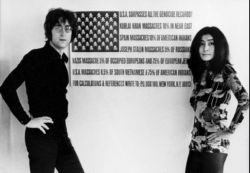Stuart:
The recent popularity in big screen political documentaries continues with The U.S. vs. John Lennon, and as Michael Moore has pointed out, studios will continue to back intelligent, politically critical docos so long as they can make money from them. Until the day audiences get bored with such fare, we should be thankful that the popular media is an outlet for perspectives other than that of the conservative right.
 Whilst it’s clearly not a balanced doco, The U.S. vs. John Lennon is an insightful exploration of the lengths to which the Nixon administration went to silence one of the most outspoken pop icons of the late 60s and early 70s. Yoko Ono allowed filmmakers David Leaf and John Scheinfeld access to heaps of previously unseen private footage, which is probably why it could never push any perspective other than the one it does.
Whilst it’s clearly not a balanced doco, The U.S. vs. John Lennon is an insightful exploration of the lengths to which the Nixon administration went to silence one of the most outspoken pop icons of the late 60s and early 70s. Yoko Ono allowed filmmakers David Leaf and John Scheinfeld access to heaps of previously unseen private footage, which is probably why it could never push any perspective other than the one it does.
And it’s clearly a very strong case being made. Years after leaving behind the friendly-faced mop top persona of the early Beatles, John Lennon became an activist to be reckoned with. Forever pushing the concept of peace, he was also apparently instrumental in the release of John Sinclair, who had been jailed for two years over the sale of two joints to undercover narcotics cops. He also used his immense popularity and immediately recognisable name to have televised discussions with members of the controversial Black Panther Party, not to mention voicing his objection to the already unpopular Vietnam War. It’s because of activity such as this that the FBI investigated him, apparently going so far as to have his phone tapped and his movements under surveillance.
There is a vast array of ‘witnesses’ who make their appearance in the documentary, from John Dean (White House Counsel to President Richard Nixon) to Black Panther co-founder Bobby Seale to Yoko herself. My cynicism monitor cuts in here, only because interviewees on documentaries are all there in the hopes they have decent screentime. As media savvy personalities I wonder if their concise sound bites are sometimes purposefully controversial. That being said, there’s no nonsense to be had here. Everyone understands perfectly the significance of John Lennon’s activism and its ramifications. The film is quite restrained when it comes to contemporary allusions, though everyone probably knows they can leave it to Gore Vidal to put Richard Nixon and George Bush Jnr. in the same sentence.
The U.S. vs. John Lennon moves at a great pace, with a good mix of contemporary interviews, historic footage and a huge selection of John Lennon songs. Unfortunately it feels the need to cover that day in December 1980 outside the Dakota building, and it’s such a rushed (and irrelevant) moment that it does no justice to the man whatsoever. It just feels well, rude, after all that which came before. The rest of the film is a solid documentary that explores the boundaries of free speech and the limitations that are placed on freedom in the West, both then and now.
Rating: